The below table of contents is interactive to help you navigate this page so that you are able to review the information more easily. If you would like to print these guidelines or view them as a PDF, you may review them in both standard print and large print format. PDFs were last reviewed August 2019. This page was last updated in August 2022.
Introduction
Image descriptions provide a textual description of images presented in digital documents. These descriptions support the inclusion of blind, low vision, and low-tech users of all AAA products. This ensures that information presented in a purely visual format, especially a digital graphic, is accessible to anyone who may not be able to physically see the visual for any reason. Image descriptions may also be used in printed products, especially when printed in Braille, to provide information about the visuals supplementing text. Printing the text of an image description may also provide sighted readers another option for processing visual information.
Importantly, image descriptions are a type of visual description. Visual descriptions provide information about the visual appearance of spaces, objects, people, and more. The term “visual description” can explain when someone describes the visual context of a location, person, or space in real time, and it may also be used in reference to image and audio descriptions. These guidelines provide examples for creating image descriptions, but please be aware that aspects of these guidelines may also be applied to visual descriptions more broadly.
Image descriptions are necessary for most visuals except for those solely included for aesthetic and decorative appeal. Examples of visuals include:
- Logos
- Pictures
- Art
- Graphs
- Maps
- Charts
- Videos
When describing visual material, be attentive about describing content as well as aesthetics and style.
The Difference Between Alt Text, Image Descriptions, and Captions
The below descriptions explain the difference between alt text, image descriptions, and captions. To be fully accessible, providing both alt text and image descriptions is recommended. Captions are optional in most circumstances, and should not be used in lieu of alt text and image descriptions.
- Alt text: a brief textual explanation of an image, used in the coding of digital graphics online and in digital files; alt text is not visible on websites unless the image does not appear
- Image description: a detailed explanation of an image that provides textual access to visual content; most often used for digital graphics online and in digital files; can be used as alt text in coding to provide access to more complete information
- Caption: a brief explanation that provides further information about an image; these do not need to focus on visual components and can be supplemental to any image
Perkins School for the Blind has published a fantastic resource created by Veroniiiica (Veronica with Four Eyes) entitled, “How to Write Alt Text and Image Descriptions for the visually impaired”.
Note: It is important to be aware that many, though not all, members of the blind and low vision community consider “visually impaired” to be outdated and inappropriate language. When discussing issues related to the blind and low vision community, use the phrase “blind and low vision”, unless an individual has personally indicated otherwise.
Visual Descriptions and Audio Descriptions
When discussing alt text, image descriptions, and captions, you may also encounter the terms “visual description” and “audio description,” both of which are defined below. V
- Visual description: a description of the visual context of a location, person, or space; may be provided in real time; also an umbrella term for image and audio descriptions
- Audio description: a vocal narration describing the visuals in videos and other multimedia products
- Caption: a brief explanation that provides further information about an image; these do not need to focus on visual components and can be supplemental to any image
Examples
This section includes examples of the following types of visuals:
- Logo
- Human portrait
- Animal picture
- Blurry picture
- Drawn image
- Map
- Graphics with text
Each visual provides an example of an image description, alt text, and caption, to provide examples of how these three pieces of information relate to each other.
Example 1: Logo

Image description: The American Anthropological Association logo, a red swirling symbol, next to text that reads, “American Anthropological Association – Advancing Knowledge, Solving Human Problems”.
Alt text: American Anthropological Association (AAA) Logo
Caption: The American Anthropological Association (AAA) logo is used for branding and marketing purposes.
Example 2: Human portrait
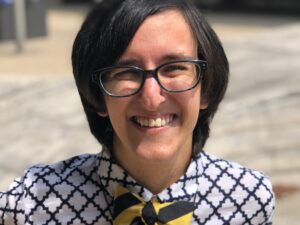
Image description 1 – more descriptive: Nell, a white woman with short black hair, is outside on a bright day. She wears thick, black-rimmed glasses and smiles at the camera. She also wears a white and dark-colored quatrefoil collared shirt and a black and gold diagonal stripe bow tie.
Image description 2 – less descriptive: A picture of Nell outside smiling at the camera.
- Note: Regarding identity features, there are a number of factors to consider when determining to include details about people’s individual traits. Ideally, people identify their features individually, as displayed in the above description of Nell. Without knowing who this person is, the below description provides information without assumptions about the person’s identity:
- Alternative image description 1 – more descriptive: Nell, a light-skinned person with short black hair, is outside on a bright day. They wear thick, black-rimmed glasses and smiles at the camera. They also wear a white and dark-colored quatrefoil collared shirt and a black and gold diagonal stripe bow tie.
Alt text: A portrait of Nell.
Caption: AAA’s Accessibility and Meetings Coordinator
Example 3: Animal picture
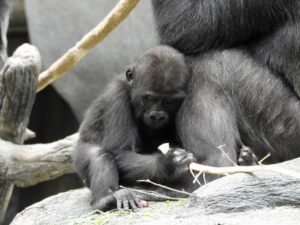
Image description: A baby gorilla sits on a large flat rock surface, holds a bamboo branch in one hand, and hugs a larger gorilla’s leg with the other hand while resting their face against the other gorilla’s leg. Only part of the larger gorilla is visible in the picture.
Alt text: A picture of a baby gorilla hugging its mother
Caption: A photo of a baby gorilla taken during a visit to the Brookfield Zoo in Chicago, IL.
Example 4: Blurry picture

Image description: A blurry photo of the legs of two people going upstairs with silver railing on the left.
Alt text: Blurry photo of legs
Caption: This photo captures the moment when people are rushing upstairs.
Example 5: Drawn image
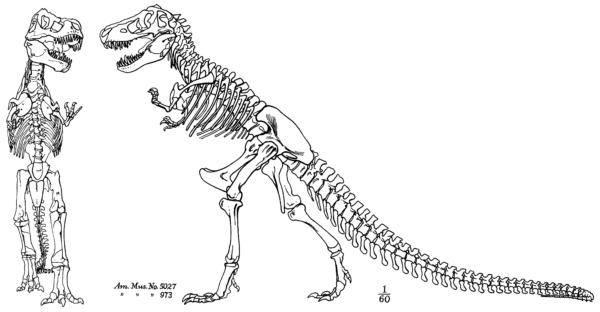
Image description: An inaccurate scientific diagram of a t-rex skeleton. The left displays a frontal view of the fossil, and the right displays a left profile shot of the body. Text on the figure reads: “Am. Mus. No. 5027, “ “ “ 973” and “1/60”.
Alt text: An inaccurate scientific diagram of a t-rex skeleton
Caption: This inaccurate scientific diagram of a t-rex skeleton as an excellent example of why it is important to confirm the accuracy of your resources prior to publication.
Example 6: Map
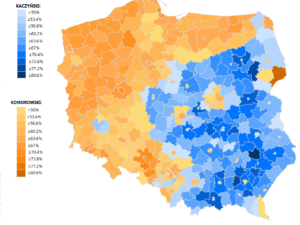
Image description: A map of Poland with voting districts outlined. The map outlines the results of the 2010 Presidential elections. The majority of the left side of the map is various shades of orange and the majority of the right side is various shades of blue. A key to the left outlines the shades of blue that represent the percentage of votes won by Komorowski and the shades of orange that represent the percentage of votes won by Kaczyński.
Alt text: A map of Poland with voting districts filled in with blue or orange.
Caption: This map of Poland displays the results of the 2010 Presidential elections.
Return to Table of Contents
Example 7: Graphics with text
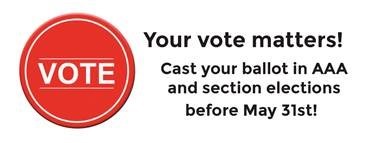
Image description: A red circle with the word “Vote” inside. Right of the circle reads “Your vote matters! Cast your ballot in AAA and section elections before May 31st!
Alt text: Your vote matters! Graphic for AAA’s elections
Caption: No caption provided.
Practice
Creating image descriptions, like all skills, takes time to learn. It takes time to learn what is important and what is superfluous information in a visual context and from there to learn what to share or not share. One way to learn this is through practice. The AAA has created an “Image Description Practice Form” to provide an opportunity to practice creating image descriptions. This form does not provide feedback, but it does give a way to compare your image descriptions with examples.
The form provides three different types of visual graphics that you describe in one section. You copy each image description you create to paste in the next section. In the following section, the form shares an example of an image description of each image that you can compare to your pasted image description.
Please be aware that image descriptions do not have to be identical. Therefore, if your image description is not an exact match, that is ok! This is an exercise for your own experience.
If you have any questions about image descriptions or hope for feedback and more practice, please feel free to reach out to the AAA Accessibility & Meetings Coordinator, Nell (she/her/hers), using the AAA Contact Form, option “Accessibility.”
Additional Resources
More reasons to do image descriptions.
belenen. Aug. 31, 2016. “22 months writing image descriptions: 4 awesome side-effects/resources & explanation of the need.” Medium. Blog post. Link: https://medium.com/@belenen/22-months-writing-image-descriptions-4-awesome-side-effects-resources-explanation-of-the-need-c686fae8e3e5
Presentation Guidelines for Success & Accessibility
These are the guidelines AAA encourages all meeting attendees to review while working on their presentations and prior to their presentation at any meeting. Image descriptions are only one part of a presentation.
Poster/Gallery Session Guidelines for Success & Accessibility
These are the guidelines AAA encourages all meeting attendees to review while working on their posters. Image descriptions are a crucial part of creating posters.
